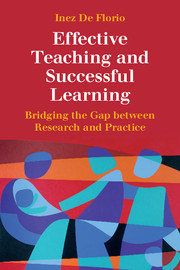Book contents
- Frontmatter
- Epigraph
- Contents
- Preface
- Introduction
- 1 Main Features of Scientific Research on Education
- 2 Important Types of Scientific Research on Education
- 3 Main Features of Evidence-based Research on Education
- 4 Meta-Analyses on Education
- 5 A Synthesis of Over 800 Meta-Analyses Relating to Achievement
- 6 Scaffolding Effective Teaching and Successful Learning
- 7 Planning and Starting the Lesson
- 8 Presenting Knowledge and Skills – Assertive Questioning
- 9 Guided and Independent Practice
- 10 Cooperative and Project-based Learning
- 11 Feedback – Reciprocal and Informative
- Concluding Remarks: Standards Need More Evidence
- References
- Index
1 - Main Features of Scientific Research on Education
Published online by Cambridge University Press: 05 June 2016
- Frontmatter
- Epigraph
- Contents
- Preface
- Introduction
- 1 Main Features of Scientific Research on Education
- 2 Important Types of Scientific Research on Education
- 3 Main Features of Evidence-based Research on Education
- 4 Meta-Analyses on Education
- 5 A Synthesis of Over 800 Meta-Analyses Relating to Achievement
- 6 Scaffolding Effective Teaching and Successful Learning
- 7 Planning and Starting the Lesson
- 8 Presenting Knowledge and Skills – Assertive Questioning
- 9 Guided and Independent Practice
- 10 Cooperative and Project-based Learning
- 11 Feedback – Reciprocal and Informative
- Concluding Remarks: Standards Need More Evidence
- References
- Index
Summary
Before being able to see learning processes and their results through the eyes of the students (Hattie, 2009, 2012), educators and teachers should take a closer look at relevant findings of scientific research on education. Why is it necessary to spend a certain amount of time and effort in studying research when you, as a teacher, are more or less satisfied with the learning outcomes of your students?
In a complex field like education it is always useful to question habits and conventions in the light of newer and newest research findings. Furthermore, as part of the debate on accountability, we have to answer to ourselves as to whether we choose the best possible teaching and learning activities with regard to our individual learners.
The following statements and explanations are a succinct introduction to the main features of scientific research on education. The overall aim of these introductory remarks is to enable teachers in training and in service to appraise research findings. If an educator concludes that a research proposal may work better as usual practices, new strategies as well as whole intervention programs may be tried out. Don't forget that even highly recommended tools must be adapted to your specific teaching and learning context. Nevertheless they still might be revealed as inappropriate, for various reasons.
A CONFERENCE TALK
Sarah and Kate, both ELA high-school teachers, meet just once a year at their state's annual curriculum conference. During the year, they keep in loose email contact, exchanging ideas and sometimes teaching materials. Recently, they participated in the same webinar.
SARAH: You don't look very happy. Is there something wrong?
KATE: No, no, but I can't hear it anymore, evidence-based teaching, evidence-based learning, evidence-based everything …
SARAH: But don't you think it's a good thing that we are invited to question our teaching habits?
KATE: Sure, but you can't analyze the whole teaching and learning process through experimental research.
SARAH: That's true. But there are many aspects of teaching and learning that I considered in a certain way without questioning either the premises or the consequences. The results of scientific research showed me that I wasn't aware of certain details.
KATE: Don't misunderstand me. I'm not against research into education, not at all. What bothers me is the fact that experiments or quasiexperiments are considered a cure-all.
- Type
- Chapter
- Information
- Effective Teaching and Successful LearningBridging the Gap between Research and Practice, pp. 8 - 26Publisher: Cambridge University PressPrint publication year: 2016



